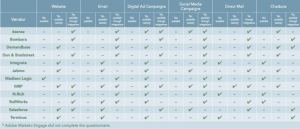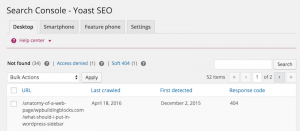Small businesses struggle day in and day out with budget cuts, the pressure to break even and manage the company data while staying within the permitted budget. The most common question we get to hear from budding entrepreneurs is “what DBMS should I go for?”
We would love to answer that question in just one word. But that would hardly answer the real questions you need to be asking today. Every small business has problems with databases and database management. While some part of yourcontact data is residing in MS Outlook, huge parts of your marketing data is actually with your Facebook profile, LinkedIn accounts and twitter log-ins.
What are the different database solutions you can consider?
For a small company quite a few factors drive the choice of their DBMS. While the volume of data is definitely one of the factors, the cost involved with the database management system setup and maintenance is the more real concern. Here are the three most popular options that most small businesses consider before choosing their DBMS –
Desktop databases – it was not uncommon for small companies to opt for desktop databases even till 2013. However, with the rise of Big Data and cloud based storage and management systems more companies are showing preference for cloud based systems. The biggest disadvantage of using desktop databases is the lack of communication with web applications. But, they are still striving since they are cheap, easy to handle and easy to get. If you want to just keep tabs on the traditional data formats that include customer details, inventory and shipment dues then you can happily go for a desktop database system.
Server business database – this is a much bigger expense and a much bigger commitment. It involves bigger employment costs as well. Since most server based databases and DBMS require a trained personnel with the specific knowledge that can maintain and update the company database.
Web-based DBMS – this is the new trend that allows you to pool data from your website, social media accounts and other possible sources. You can even choose to build a complete data focused webpage from the data stored in these web-based databases. They can give your business a lot of flexibility and opportunities for scalable growth. It has made gaining access to relevant information extremely easy, and cost efficient as well.
What is the real need of a DBMS?
What you need is a system that can pool everything together under one roof and protect it as well from unauthorized access. So, here are the real questions you should be asking before you go about shopping for a DBMS –
What do you need from your DBMS?
Who will have access to your data?
Who will be supporting the DBMS technically?
What do you need from your DBMS?
Your DBMS should be able to manage all your contacts from your address book, should be able to keep a tab on the events, should be able to manage and update a to-do task list and document all activities in real-time. A good DBMS should be able to focus on different segments, patterns and connections, and form a consolidated database without any repetitions.
Most of these needs are fulfilled by web-based database management systems. It is ideal for all small businesses and startups as well. The web-based databases are extremely flexible and can be updated in real-time. Website based databases are dynamic tools that can be leveraged to meet your content marketing, ecommerce, security and data sharing needs.
Almost all web-based storage systems and management tools are completely scalable. This makes sure that your management system grows steadily and securely with the data your company is incurring everyday from different sources. Another huge advantage is the easy migration of data. Since there is no physical storage space involved you can move your company data from one cloud location to another seamlessly.
Who will have access to your data?
The key advantage of opting for website based database services is the easy access of all authorized members to the stored data from any physical location. Technically this means, the elimination of on-site servers and on-site server maintenance. A web-based system cuts down over-head costs and helps in better management of all financial systems. You can bypass the entire buying and licensing procedure that server-based DMBS require, hence saving more for your other business needs. Online databases hardly incur similar costs and yet offer better accessibility and data growth.
Who will be supporting the DBMS technically?
Of the few things you need to consider while implementing a web-based database is the department or individuals who will be taking care of the DBMS technically. Firstly, you will need someone who can securely migrate all the data to the web-based system from your hard drives. Secondly, you will need to implement some form of security system to protect the data and ensure the requirement of proper authorization of cloud access. All forms of tools and software programs are available to encrypt and protect your data in the cloud.What you need is the person who can tell what your company data needs.
The implementation of security or any form of data encryption should not interfere with the data flexibility. Your database should remain scalable and accessible while ensuring the security of your data.
A web-based DBMS is the instant solution for many of the small business organizations and their data storage problems. Cloud storage increases the ease of access, ease of data migration and offers growth of your company data. Almost all small companies and startups are choosing web-based database services in place of server based databases and desktop databases for all the advantages discussed above.
Business & Finance Articles on Business 2 Community(54)







